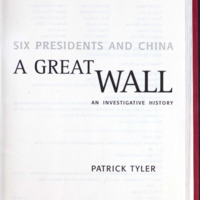-
Title
-
A great wall : six presidents and China : an investigative history
-
Description
-
Studies how America's relationship with China has changed from 1969 to 1999, focusing on how American presidents have dealt with China's rulers.
-
Identifier
-
832237
-
1891620371
-
Creator
-
Tyler, Patrick
-
Format
-
1st ed.
-
Source
-
Brian Lamb Booknotes Collection
-
Gift of Brian Lamb, 2011.
-
Catalog record
-
Language
-
eng
-
Date
-
1999
-
Program air date: October 31, 1999
-
Publisher
-
PublicAffairs
-
George Mason University. Libraries. Special Collections & Archives
-
Text
-
Transcription of Annotations
Notes on front endpapers refer to Nixon's meeting with Mao in 1971, Ford's trip to China in 1975, Mao's and Zhou's deaths in 1976 and the diseases that killed them. Also mentioned is the Shanghai Communiqué - Kissinger referring to Russia as the common opponent - and Chiang Kai-shek's attempt to acquire nuclear capability. Back endpapers contain notes on the Chestnut program which refers to spying activities by the CIA and China on the Western Russian border during the Carter administration; on the author's view of the relationship between Nixon and Mao, Nixon's intention to normalize relations with China in his second term, Deng's insistence on secret arms sales to Taiwan, the significance of human rights in the relationship between China and the United States, the Taiwan Relations Act and various incidents from the Reagan, Bush, and Clinton administrations illustrating the precarious relationship between the United States, China and Taiwan. Also included is a list of politicians who were interviewed by the author for this book, a list of Chinese leaders, and several important events from China's recent history - the Long March in 1936, the Cultural Revolution, and the events on Tiananmen Square. The following quotes and questions are also part of the notes: "When do these memorandums of conversations become public?" -- "What's [the] impact of [the] Belgrade bombing?" -- "How outdated are China's military forces?" -- "What are the risks of accidental war?" -- "March 1996: 1st act of American coercion against the Chinese since 1958." -- "What was Mao's 'Great Leap Forward'?" -- "Soviet/China border: 1969, de Gaulle: "if you are not ready to make war, make peace"." -- "What is the CIA's Non-Proliferation Center?" -- "What role do Human Rights play?" -- "What role does Taiwan play?" -- "What role does the personal ambition of the players, i.e. Kissinger, play?" -- What role do other countries play, e.g. India, Pakistan?" -- Annotations by Brian Lamb in the margins and underlining of pertinent phrases throughout the book. -- Examples: p. 17: "Every issue between China and U.S. is up in the air." -- p. 179: "1974: Brezhnev wanted a "treaty of friendship and cooperation", SALT negotiations, impeachment hearings, phlebitis." -- p. 291: "During Lilley's tenure as CIA station chief under Bush in Beijing, his diplomatic cover was revealed by journalists in the United States seeking to expose CIA officers working overseas." -- p. 427: "A new president will confront the complexity of China and will make the decision that each of the preceding presidents has made: whether or not to run against China - in other words to exploit for domestic political gain the unresolved issues of Taiwan, Tibet, proliferation, espionage, trade, religious freedom, and human rights, or whether to run on the principle that China, like Russia, presents a multi-faceted challenge for American diplomacy that cannot be exempted from politics, but which needs to be protected so an incoming president has the greatest latitude to formulate a constructive foreign policy."
-
Relation
-
Original Booknotes interview
-
Rights
-
This work may be protected by copyright laws and is provided for educational and research purposes only. Any infringing use may be subject to disciplinary action and/or civil or criminal liability as provided by law. If you believe that you are the rights-holder and object to Mason’s use of this image, please contact speccoll@gmu.edu.
 832237.pdf
832237.pdf